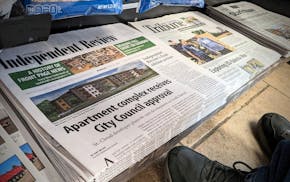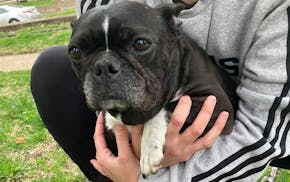David O'Connor had one last medal pinned to his chest near the end of his life. One final honor for a man who served on the battlefields of two wars and in the classroom for generations of southwestern Minnesota students.
Few in his shop class knew their teacher — "Big O" — had landed on Utah Beach on D-Day and led his men in a bayonet charge on Heartbreak Ridge. O'Connor, who put more energy into helping others than talking about himself, earned so many honors in World War II and Korea that it took 60 years to realize that the Army hadn't awarded all of them — namely, the Bronze Star he earned in Korea.
As O'Connor's own memories of his service began to slip away because of Alzheimer's disease, his family researched military records and arranged for a belated medal ceremony. On Jan. 27, U.S. Rep. Tim Walz traveled to the Minnesota Veteran's Home in Luverne to award the Bronze Star that O'Connor had earned 65 years earlier. O'Connor died there one month later — Feb. 28 — surrounded by family, including his wife of 67 years, Charlotte. He was 92.
O'Connor rarely spoke of his service and never attended military reunions. Years later, his family learned that the veterans at the gatherings still celebrated the heroism of a young First Lt. O'Connor, who earned the Bronze Star and the Silver Star in almost back-to-back engagements in the fall of 1951.
"He was not a person who wore the flag on his sleeve," said his son, Stephen O'Connor. "He would tell us he defended the Constitution and what we stood for as a nation."
O'Connor was a man with a ready smile and steady grace. He was devoted to Charlotte, his four children and the students he taught as an industrial arts teacher and driving instructor. Determined to help students learn and create, O'Connor would encourage them to collect random scraps they found around the farm — wheels, a motor, an old crank case — and help them turn it all into something they could drive away with.
The contraptions the students built "didn't look like much," Stephen O'Connor recalled with a laugh, "but they worked."
O'Connor understood the value of hands-on learning, encouraging the students he taught in Jeffers and Pipestone, Minn. "He changed so many lives," Stephen O'Connor said. "He was always taking time to work with students. They'd stop over to the house, and he'd sit down with them on the patio or the kitchen table. ... It was kind of like sharing our father."
On Facebook, one of his former students remembered him as someone who "gave me the gift of a life long love of wood working. He also taught me that if you have a gift you share it asking nothing in return. ... I often thought that [O'Connor] was very kind to me, but I realize he was very kind to everyone who crossed his path."
David O'Connor was born on May 10, 1924, to Joe and Marie (Bourdelais) O'Connor of Beresford, S.D. He left high school at age 18 to enlist in the Army and was a very young medic during the D-Day landings. He returned home, earned a degree from the University of South Dakota and married his childhood sweetheart, Charlotte Ann Kaltsulas, before being deployed to Korea.
He served as company commander for the U.S. Army Reserve in Worthington and as a recruiter for the National Guard in Pipestone. In the summers, he worked as a ranger at the Pipestone National Monument. He retired from teaching in 1989.
Besides his wife, who visited him at the veteran's home every day, and son Stephen, of Rosemount, he is survived by son Gregory, of Lenexa, Kan.; daughters Elizabeth O'Connor of St. Paul and Letitia Abrahamson of Pipestone; four sisters; four grandchildren, and five great-grandchildren. Services have been held.

In Grand Rapids, Itasca Pride is planning its first event, but there is already pushback

Former diversity worker sues University of Minnesota after firing over swastika photo

As longtime Hutchinson, Litchfield papers close, 2 newspapers launch to take their place
Mother charged with fentanyl overdose death of her 8-month-old boy in Roseville hotel room

